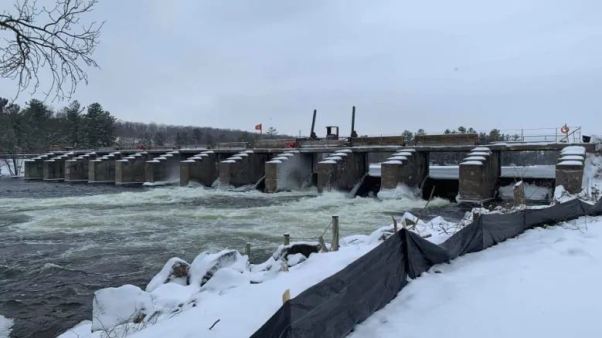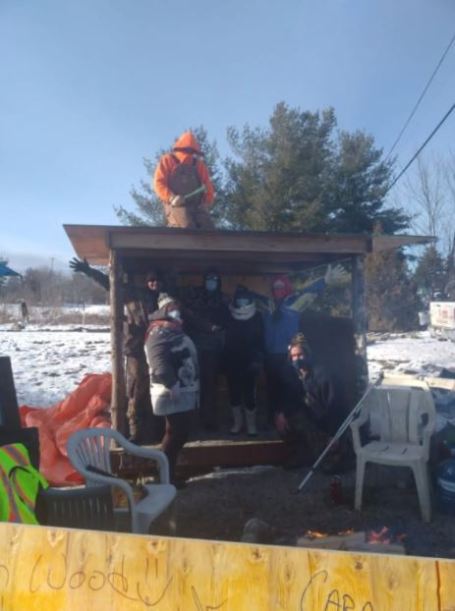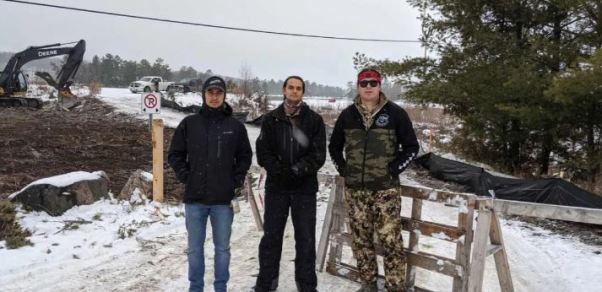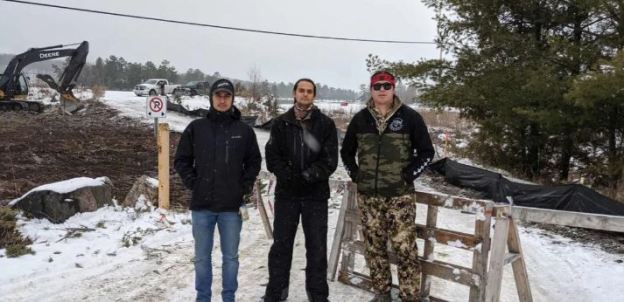
Burleigh Falls Dam is part of the Trent-Severn Waterway, now a national historic site operated by Parks Canada. The dam was originally constructed in 1912. (Dean Wood)
Group says barricades are over lack of consultation by Parks Canada
Members from an Ontario First Nation continue to block access to a dam reconstruction site because they say they were not properly consulted by Parks Canada.
Nodin Webb, leader and spokesperson for Kawartha Nishnawbe First Nation, said his community isn’t necessarily opposed to the work on the Burleigh Falls Dam, but Parks Canada should’ve involved them in the decision-making process.
Two barricades were erected last week that prevent access to the work site in Burleigh Falls, Ont., 130 kilometres northeast of Toronto.
“We’re out there defending the land until we can get confirmation from Parks Canada that there will be no further construction or demolition until they consult us, a procedure they are legally required to do,” he said.

The Kawartha Nishnawbe have vowed not to move until Parks Canada properly consults with them about the reconstruction. (Submitted by Amber Seager)
The Kawartha Nishnawbe created a community near Burleigh Falls in the early 1900s with five families from nearby Curve Lake First Nation who had lost their Indian status through enfranchisement.
The dam, which was originally constructed in 1912, is a part of the Trent-Severn Waterway, and is now a national historic site operated by Parks Canada.
The Parks Canada website indicates the dam is being fully rebuilt and construction is scheduled to be completed in the summer of 2024.
Indigenous Services Canada said in an email Kawartha Nishnawbe is not recognized as an Indian Act band.
The community’s lawyer, Christopher Reid disagrees and has been exchanging emails with Parks Canada and the federal government.
“They took away status from these people and forced them off reserves, forced them to establish a separate community on their own where they literally cleared the land, built their homes without any assistance and built their community.”
Public safety
David Britton, director of Ontario Waterways with Parks Canada, said in a statement Parks Canada has offered to meet with the Kawartha Nishnawbe on the Burleigh Falls Dam replacement project both in 2016 and more recently to understand their concerns regarding the potential impacts of the project.
Britton confirms Parks Canada has met with Curve Lake First Nation and other Williams Treaties First Nations on the first phase of the project and is working to develop fisheries monitoring and mitigation plans.

Zhaawnong Webb, Nodin Webb and Jack Hoggarth at the blockade near the Burleigh Falls Dam construction site. (Submitted by Amanda Seager)
He also explained that in its current condition, the dam poses a risk.
“A significant void at the base of the dam undermines the dam’s structural integrity, and is cause for concern regarding both public safety, and the protection of properties and species, including an important walleye fishery.”
Webb denied there have been any offers of consultation but in email correspondence provided to CBC by Reid, Parks Canada offered to meet and share its plans with the Kawartha Nishnawbe in three separate messages.
Reid indicated the level of consultation offered by Britton and Parks Canada is different than that received by Curve Lake First Nation.
He said in a statement, “offering to meet is not nearly the same thing as engaging in the kind of consultations which are legally required and which they held with communities which have much less connection to Burleigh Falls than Kawartha Nishnawbe.”
Emily Whetung, chief of Curve Lake, wrote in a statement, “We recognize that the complicated history of the Kawartha Nishinawbe, their relationship to the land at Burleigh Falls, and their assertion with the federal government, and we respect that they have an independent perspective.
“However, the Burleigh Dam is located within the recognized pre-Confederation and Williams Treaties Territory, and we feel a responsibility to protect the environment and species in the area as the reconstruction project moves forward.”
By: Sean Vanderklis, Rhiannon Johnson · CBC News · Posted: Jan 21, 2021.











